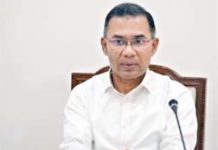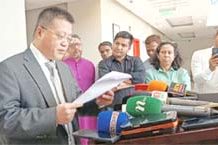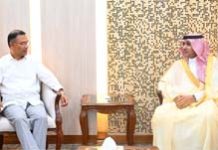C T Online Desk: Many public and private universities are running without adequate number of professors while some even do not have any at all.
Educationists and officials have said that the crisis of senior teachers is not only hampering the academic performance of these universities but also disrupting their management.
Senior educationists pointed to some social issues like the lack of decentralisation of cultural and social opportunities and the absence of financial facilities for the situation.
Some vice-chancellors said that most of the professors were not interested to join universities outside the capital city.
According to the University Grants Commission, there are currently no professors at three public universities — Rangamati Science and Technology University in Rangamati, Rabindra University, Bangladesh, in Sirajganj and Khulna Agricultural University in Khulna.
There are no professors, the UGC said, also at four private universities — Cox’s Bazar International University in Cox’s Bazar, the ZH Sikder University of Science and Technology in Shariatpur, Global University Bangladesh in Barishal and the Bangladesh Army International University of Science and Technology in Cumilla.
Besides, according to the 47th UGC annual report, there is only one professor at Bangamata Sheikh Fojilatunnesa Mujib Science and Technology University in Jamalpur while there are two professors each in Barisal University and Sheikh Hasina University in Netrokona and four in Bangabandhu Sheikh Mujibur Rahman Digital University in Gazipur — all public ones.
Among the private universities, there is only one professor each at Central Women’s University in Dhaka, People’s University of Bangladesh in Dhaka, the University of South Asia in Dhaka, Exim Bank Agricultural University Bangladesh in Chapainawabganj, Feni University in Feni, Britannia University in Cumilla, the Bangladesh Army University of Engineering and Technology in Natore, International University of Scholars in Dhaka, International Standard University in Dhaka , the University of Brahmanbaria in Brahmanbaria and the University of Skill Enrichment and Technology in Narayanganj.
At least 28 more private universities each have only two to four professors.
‘If there are no professors at a university, where will then the lecturers and the students learn?’ asked Dhaka University professor emeritus Serajul Islam Choudhury.
According to Serajul Islam, the reasons for the crisis of professors at public and private universities are different.
‘The crisis at public universities is cultural while private universities face the crisis due to financial factors,’ he said.
Senior teachers, the veteran educationist said, usually don’t want to be at public universities in the periphery of or beyond the capital as the city life boasts the most developed cultural environment resulting from industrialisation and other factors.
‘This is a deep cultural and political issue and we need to decentralise such development [across the country],’ he emphasised.
Besides, he said, a majority of the private universities are not interested to appoint professors to save money as they operate with a commercial objective.
‘If there are no professors at a university, then there will be no researches at that university,’ said Serajul Islam, adding that knowledge would not be generated at such universities for this reason.
Professor Md Habibur Rahman, VC of the Dhaka University of Engineering and Technology and president of the Association of Universities of Bangladesh, said that new universities needed to have senior teachers as these institutions should take off with experienced academics.
‘A mother’s care is essential for a child,’ he said in an analogy. ‘When the child has grown up the guidance of the mother is not that much necessary.’
According to Professor Quazi Faruque Ahmed, a member of the Education Policy 2010 formulation committee, the universities that do not have any professor are just without leaders.
‘How is it possible to start a new university without a professor?’ he posed the question.
The educationist said that most private universities did not want to hire senior faculties due to financial reasons.
On the other hand, he observed, the problem with public universities is a management issue as most of the teachers at such institutions are appointed on political consideration or based on personal likings instead of on academic background.
‘We need to change our outlook,’ he added.
Rangamati Science and Technology University’s acting VC Professor Kanchan Chakma said that they did not get any response after publishing advertisements for appointing professors.
Some had applied but they did not fulfil the requirements, he noted.
‘Yes, our academic activities are being hampered due to the absence of professors as the students are being deprived of the opportunity to learn from experienced senior teachers,’ the VC said, adding, ‘In my opinion, professors are not willing to come to and live in places like Rangamati.
He went on to say that this new university also lacked facilities for professors, which could be another reason for the reluctance of professors to join it.
Rabindra University, Bangladesh VC Professor Md Shah Azam viewed that there was no doubt that academic activities at universities were disrupted due to the absence of professors.
However, he said, new universities do not face such problems as lecturers and assistant professors can initially continue the teaching.
A new university can develop senior teachers in a decade, he said, adding that most professors do not want to join universities situated in areas distant from cities.
There is, however, no legal obligation for appointing professors to start a new public university while they have recently sent a proposal to the UGC to approve posts of professors for the university, Shah Azam noted.
Cox’s Bazar International University VC Professor Golam Kibria Bhuiyan said that a university could not produce a professor before it ran for 10 to 12 years.
‘All laws may not be ideal in reality,’ he said and added that if there was any professor at this university that would be good for it.
VC of Times University Bangladesh in Faridpur Professor AHM Aktarul Islam said that recently they had appointed three professors while the number of students was also low at the university.
‘It is good if there are professors at new universities,’ he added.
A senior leader of the Association of Universities of Bangladesh said that professors also looked after the organisational side of a university which require experiences.
Acting UGC chair and member Professor Dil Afroza Begum said that the law mandated the appointment of at least four teachers, including one professor or one associate professor, at the public universities against every department initially.
‘But new universities always cannot appoint professors,’ she added.
UGC director (public university management division) Muhammad Jaminur Rahman said that no professors could be found yet for three public universities.
‘Professors do not want to go to some universities especially outside the capital and the number of professorial positions is few at new universities,’ he added.
As some universities are not complying with the rule to appoint at least four teachers, including one professor or one associate professor against every department initially, the UGC has asked some universities to keep shut their academic activities, including at Britannia University, Cox’s Bazar International University and Times University Bangladesh, said the commission’s director for the Private University Division Md Omar Faruque. He mentioned that there was a crisis of professors for some subjects like library science.
Replying to a question, he mentioned that strong monitoring of private universities was necessary in this regard but the commission was struggling due to lack of manpower.











